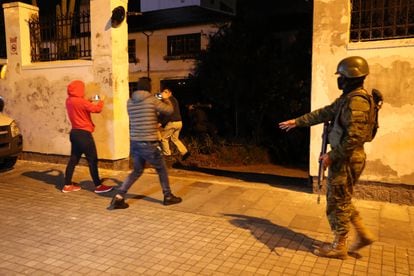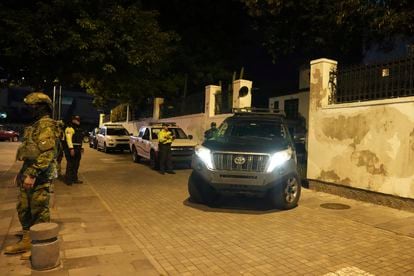The president of Ecuador, Daniel Noboa, has clearly and forcefully challenged his Mexican counterpart, Andrés Manuel López Obrador. The Ecuadorian police attacked the Mexican Embassy in Quito on Friday night with armored cars and masked agents and forcibly took away former vice president Jorge Glas, who hours before had received political asylum from the López Obrador government. Glas, Rafael Correa's right-hand man, was once one of the most powerful politicians in Ecuador and Correism came to think of him as a candidate in the last presidential elections last year, which Noboa precisely won. In the following hours he was to receive safe passage from the Ecuadorian authorities that would allow him to fly to Mexico City, but instead Noboa ordered his immediate capture. Glas, who in December sought refuge in the Mexican legation when a judge requested his arrest, has two convictions for corruption, of which he has served five years in prison. The police broke the bars with ice breakers and shook a Mexican diplomat who was trying to prevent the violation of consular space, protected by international law. The agents took Glas away in a black van with tinted windows.
The president of Mexico announced, almost immediately, the breaking of relations with Ecuador. “This is a flagrant violation of international law and the sovereignty of Mexico, which is why I have instructed our chancellor to issue a statement regarding this authoritarian act, proceed legally and immediately declare the suspension of diplomatic relations with the government.” from Ecuador,” López Obrador wrote on social networks. Mexico's Secretary of Foreign Affairs, Alicia Bárcena, added that the right to asylum is sacred and asked all of her diplomatic staff to leave the country.
Glas, vice president with Correa, had been taking refuge in the Mexican embassy since mid-December to avoid going to prison again – he has already served five years – for two corruption cases in which he has been involved. Correa himself is in Belgium asylum due to another ruling against him. Correismo assures that these are two cases of lawfare, the judicial persecution carried out by ruling politicians against their opponents. In the last hours, Mexico had granted Glas refugee status and was waiting for that special authorization that would allow him to leave the country. The Noboa Government flatly refused and argued that this diplomatic asylum was illegal. His next step has been this, a clear violation of international law that strains the relationship with Mexico to the maximum and surely with other countries in the region that will not feel comfortable with a measure of force like this.

The two protagonists of this diplomatic fight could not be more different. López Obrador has been in elected office all his life and has been through several left-wing political parties until founding his own and making it the majority party in Mexico. Politics in capital letters has been the driving force of his life. Noboa, son of the richest businessman in the country, did not even think he could win the presidential elections half a year ago, but a series of events during the campaign, such as the assassination of candidate Fernando Villavicencio, created a favorable climate around him that catapulted him to the command chair in Ecuador. In recent months he has followed the heavy-handed policies that have given Nayib Bukele such good results in terms of security against gangs. Although there is something that is related to Noboa and López Obrador: the great popularity they possess. The Mexican has a good chance of putting someone he trusts in office when he leaves this year and Noboa, if everything continues on the same path, will win the elections again in 2025. Correismo would like to come to power to review the cases of Correa and Glas, but now Noboa stands in the way.
Now he has fallen from grace, but Glas became one of the most powerful politicians in Ecuador during the 10 years that he governed the Citizen Revolution, the left-wing socialist movement that Correa led. He began coordinating electricity and telephone companies and later took charge of the Coordinating Ministry of Strategic Sectors, one of the most important in the State structure. He was responsible for public policy on oil, mining, electricity, telecommunications and water resources. Ecuador then experienced a great moment of development thanks to oil and raw materials. On his day it was learned that he plagiarized his thesis to graduate as an engineer and that his father, a school principal, was sentenced for raping a 13-year-old student whom he impregnated.

Upon his rise to power, he only had to be vice president of the country and he was twice, first with Correa and then with Lenin Moreno. It was his moment of greatest glory, but also the beginning of the end. Glas was prosecuted for illicit association in the so-called Odebrecht case, in which he was sentenced to six years in prison. Shortly after the sentencing, he was also found guilty of the crime of bribery in the case called Bribes, for which he received an eight-year sentence. Both investigations put Glas at the head of a corruption network that, together with Correa and several other government officials, negotiated contributions from multinational companies for the Alianza País political party.
In addition to the two sentences for corruption that he should be serving in the Cotopaxi prison, the former vice president is currently being prosecuted for an alleged crime of embezzlement, which consists of stealing from the public treasury. According to the Prosecutor's Office, he diverted public funds that should have been allocated to works for the reconstruction of the provinces of Manabí and Esmeraldas, affected by the 2016 earthquake. The investigation by the Public Ministry indicates that at least 368 million dollars were used in other works that were not urgent, but that in the context of the emergency were used “to avoid public contracting procedures,” according to what prosecutor Diana Salazar said at the charging hearing, who got the judge to order preventive detention against him. Before the court order was issued, Glas went ahead and took refuge in the Mexican embassy. He believed he was safe there, everyone believed it, it seemed like a victory to have received asylum. Correa celebrated it on social networks. But no one counted on Noboa's order to capture him at any price, even if it meant blowing up relations with a country as powerful as Mexico. The fight between Noboa and López Obrador has only just begun.
Subscribe to the EL PAÍS Mexico newsletter and to whatsapp channel and receive all the key information on current events in this country.
#Mexico #breaks #relations #Ecuador #police #assault #Embassy #Quito